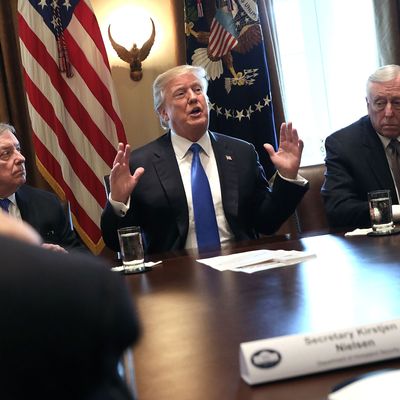
Donald Trump’s televised See I Am Too a Real President meeting yesterday largely succeeded in its immediate goal: News coverage showed Trump in the act of president-ing with the air of a man who is, if not a stable genius, at least compos mentis. And yet the longer-term goal, to craft an immigration deal, remains elusive. One reason is that the parties have wide substantive policy disagreements. Another is that Democrats have no incentive to make bipartisan deals, which will help Trump’s popularity (and therefore hurt Democrats in the midterm elections). But there is also yet another, more unusual reason: Trump is not actually capable of carrying out the role he performed on-camera.
Trump was not pretending when he expressed a desire to make a deal. He truly will sign anything Congress puts in front of him. The Republican Party’s de-personing of Steve Bannon reveals how shallow his commitment to nationalist ideology truly runs. Trump likes to talk about the wall and the alleged criminality of undocumented immigrants because it plays well on the stump, but his overwhelming impulse is to cater to whatever audience has his momentary attention.
Trump actually does seem to care about winning bipartisan approval. A little-noticed theme of his interview with Michael Schmidt last month was a longing for Democratic legislative partners. At times he berated Democrats for failing to deal with Trump in a way Trump considered appropriately conciliatory:
“[Manchin] talks. But he doesn’t do anything. He doesn’t do. ‘Hey, let’s get together, let’s do bipartisan.’ I say, ‘Good, let’s go.’ Then you don’t hear from him again. I like Joe. You know, it’s like he’s the great centrist. But he’s really not a centrist. And I think the people of West Virginia will see that. He not a centrist.”
At other times, he implored Democrats to join him and predicted they would:
Had they asked, “Let’s do a bipartisan,” Michael, I would have done bipartisan. I would absolutely have done bipartisan …
Now, in my opinion, they should come to me on infrastructure. They should come to me, which they have come to me, on DACA. We are working … We’re trying to something about it. And they should definitely come to me on health care. Because we can do bipartisan health care. We can do bipartisan infrastructure. And we can do bipartisan DACA.
SCHMIDT: What are you willing to do on infrastructure? How far are you willing to go? How much money?
TRUMP: I actually think we can get as many Democrat votes as we have Republican …
But the Democrats should come to a bipartisan bill. And we can fix it. We can fix it. We can make a great health care plan. Not Obamacare, which was a bad plan. We can make a great health care plan through bipartisanship. We can do a great infrastructure plan through bipartisanship. And we can do on immigration, and DACA in particular, we can do something that’s terrific through bipartisanship.
This does not appear to be mere chatter. Trump apparently recognizes that unified Democratic opposition has taken a toll on his popularity and craves the opportunity to establish his relevance as a bipartisan deal-maker. Yet his ability to carry this off is severely hampered by his allergy to policy detail. It is not only complex or unfamiliar issues like health care that have vexed Trump. Even his policy wheelhouse has proved beyond his command as a policy-maker.
The Washington Post recently reported that Trump has expressed his opposition to funding infrastructure through public-private partnerships. This is a subject Trump has some experience with through his business career, and he is absolutely correct: Giving builders public incentives has not produced the kinds of infrastructure voters want. “He doesn’t think they will work,” a source explains.
And yet, the Trump administration remains in favor of these partnerships anyway. Gary Cohn publicly endorsed public-private partnerships as the way to create more infrastructure. A White House press secretary tells the Post: “The President’s infrastructure vision is very clear and is based around 2 main goals: leveraging federal funds as efficiently as possible in order to generate over $1 trillion in infrastructure investment and expediting the burdensome and lengthy permitting process.”
This is quite remarkable. Trump has apparently been overruled by his own administration. The president is one figure jostling for influence over Trump-administration policy, but he has lost out.
The same thing has happened on immigration. Anita Kumar has a detailed report quoting numerous Republican sources on the ways Stephen Miller, the arch-restrictionist White House aide, has subverted deals to protect Dreamers. “It’s no secret that he’s an obstacle to getting anything done on immigration,” one Republican House member tells Kumar. The same dynamic occurred last fall, when Trump struck a deal with Democratic leaders, only for the deal to collapse when Miller got involved.
If Miller keeps undermining the deals Trump wants to make, why can’t Trump just ignore him? The unstated subtext of the stories blaming Miller is that Trump doesn’t understand the policy well enough to do that. He can make a deal with Chuck and Nancy, and it will sound good to him, but then Miller will get face time with Trump, and whatever Miller says will sound good to him, too. As Kumar notes, “Miller’s close relationship to the president, which spans the campaign and transition, means [Republicans] are unlikely to do or say anything to get him out of the negotiations.”
It’s hard to make a deal with a president if the president doesn’t understand anything about the deal beyond his belief that deals are good.






























